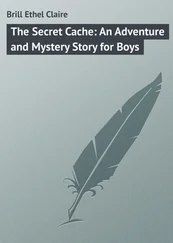Ethel Brill - The Island of Yellow Sands - An Adventure and Mystery Story for Boys
Здесь есть возможность читать онлайн «Ethel Brill - The Island of Yellow Sands - An Adventure and Mystery Story for Boys» — ознакомительный отрывок электронной книги совершенно бесплатно, а после прочтения отрывка купить полную версию. В некоторых случаях можно слушать аудио, скачать через торрент в формате fb2 и присутствует краткое содержание. Жанр: foreign_prose, Прочие приключения, foreign_language, на английском языке. Описание произведения, (предисловие) а так же отзывы посетителей доступны на портале библиотеки ЛибКат.
- Название:The Island of Yellow Sands: An Adventure and Mystery Story for Boys
- Автор:
- Жанр:
- Год:неизвестен
- ISBN:нет данных
- Рейтинг книги:4 / 5. Голосов: 1
-
Избранное:Добавить в избранное
- Отзывы:
-
Ваша оценка:
- 80
- 1
- 2
- 3
- 4
- 5
The Island of Yellow Sands: An Adventure and Mystery Story for Boys: краткое содержание, описание и аннотация
Предлагаем к чтению аннотацию, описание, краткое содержание или предисловие (зависит от того, что написал сам автор книги «The Island of Yellow Sands: An Adventure and Mystery Story for Boys»). Если вы не нашли необходимую информацию о книге — напишите в комментариях, мы постараемся отыскать её.
The Island of Yellow Sands: An Adventure and Mystery Story for Boys — читать онлайн ознакомительный отрывок
Ниже представлен текст книги, разбитый по страницам. Система сохранения места последней прочитанной страницы, позволяет с удобством читать онлайн бесплатно книгу «The Island of Yellow Sands: An Adventure and Mystery Story for Boys», без необходимости каждый раз заново искать на чём Вы остановились. Поставьте закладку, и сможете в любой момент перейти на страницу, на которой закончили чтение.
Интервал:
Закладка:
IV
LAUNCHED ON THE GREAT ADVENTURE
On the morning of the third day after the departure of the last brigade of the fleet, Etienne appeared at the Sault. At the post he purchased a supply of corn, a piece of fat pork, some ammunition and tobacco and two blankets, and was given credit for them, promising to pay in beaver skins from his next winter’s catch. Of the two lads he took no notice whatever, but his behavior did not surprise them. They knew exactly what was expected of them, and in the afternoon of the day he made his purchases, they left the post quietly. Wishing to give the impression that they were going for a mere ramble, they took no blankets, but each had concealed about him fish lines, hooks, as much ammunition as he could carry comfortably and various other little things. The fact that they were carrying their guns, hunting knives and small, light axes, did not excite suspicion. Game was extremely scarce, especially at that time of year, in the vicinity of the post, the Indians and whites living largely on fish. One of the half-breeds laughed at the boys for going hunting, but they answered good-naturedly that they were not looking for either bears or moose.
While in sight of the post and the Indian camp, the two lads went at a deliberate pace, as if they had no particular aim or purpose, but as soon as a patch of woods had hidden the houses and lodges from view, they increased their speed and made directly for the place where they were to meet Etienne. The spot agreed upon was above the rapids, out of sight of the post, where a thick growth of willows at the river’s edge made an excellent cover. There they found the Ojibwa, in an opening among the bushes, going over the seams of his canoe with a piece of heat-softened pine gum. He grunted a welcome, but was evidently not in a talkative mood, and the boys, knowing how an Indian dislikes to be questioned about his affairs, forbore to ask what had caused his long delay. They had expected to start at once, but Etienne seemed in no hurry. When he had made sure that the birch seams were all water-tight, he settled himself in a half reclining position on the ground, took some tobacco from his pouch, cut it into small particles, rubbed them into powder and filled the bowl of his long-stemmed, red stone pipe. He struck sparks with his flint and steel, and, using a bit of dry fungus as tinder, lighted the tobacco. After smoking in silence for a few minutes, he went to sleep.
“He thinks it best not to start until dark,” whispered Jean to his companion. “Doubtless he is right. We might meet canoes on the river and have to answer questions.”
Ronald nodded, but inaction made him restless, and presently he slipped through the willows and started to make his way along the shore of the river. In a few moments Jean joined him, and they rambled about until the sun was setting. When they returned to the place where Etienne and the canoe were concealed, they found the Indian awake. He had made a small cooking fire and had swung his iron kettle over it. As soon as the water boiled, he stirred in enough of the prepared corn and fat to make a meal for the three of them. While they ate he remained silent and uncommunicative.
Dusk was changing into darkness when the three adventurers launched their canoe. They carried it into the water, and Ronald and Jean held it from swinging around with the current while Nangotook loaded it. To distribute the weight equally he placed the packages of ammunition, tobacco, corn and pork, a birch-bark basket of maple sugar he had provided, the blankets, guns, kettle and other things on poles resting on the bottom and running the entire length of the boat. A very little inequality in the lading of a birch canoe makes it awkward to manage and easy to capsize. When the boat was loaded Ronald held it steady, while the Indian and Jean stepped in from opposite sides, one in the bow, the other in the stern. Ronald took his place in the middle, and they were off up the River Ste. Marie, on the first stage of their adventure.
Where the river narrows opposite Point aux Pins, which to this day retains its French name meaning Pine Point, there was a group of Indian lodges, but the canoe slipped past so quietly in the darkness that even the dogs were not disturbed. The voyageurs rounded the point and, turning to the northwest, skirted its low, sandy shore. The water was still, and in the clear northern night, traveling, as long as they kept out from the shore, was as easy as by daylight.
As they neared Gros Cap, the “Big Cape,” which, on the northern side, marks the real entrance from Ste. Mary’s River into Whitefish Bay, Nangotook, in the bow, suddenly made a low hissing sound, as a warning to the boys, and ceased paddling, holding his blade motionless in the water. The others instantly did the same, while the Indian, with raised head, listened intently. Evidently he detected some danger ahead, though no unusual sound came to the blunter ears of the white boys.
Suddenly resuming his strokes, Nangotook swerved the canoe to the right, the lads lifting their blades and leaving the paddling to the Ojibwa. As they drew near the shadow of the shore, the boys discovered the reason for the sudden change of direction. Very faintly at first, then with increasing clearness, came the sound of a high tenor voice, singing. It was an old song, brought from old France many years before, and Jean knew it well.
“Chante, rossignol, chante,
Toi qui a le cocur gai;
Tu as le coeur a rire,
Moi je l’ai-t-a pleurer,”
sang the tenor voice. Then other voices joined in the chorus.
“Lui ya longtemps que je t’aime,
Jamais je ne t’oublierai.”
A rough translation would be something like this:
“Sing, nightingale, sing,
Thou who hast a heart of cheer,
Hast alway the heart to laugh,
But I weep sadly many a tear.
A long, long time have I loved thee,
Never can I forget my dear.”
By the time these words could be heard distinctly, the adventurers had reached a place of concealment in the dark shadow of the tree-covered shore. There they remained silent and motionless, while three canoes, each containing several men, passed farther out on the moonlit water. They were headed for the Sault, and were evidently trappers or traders from somewhere along the north shore, coming in to sell or forward their furs and to buy supplies. Not until the strangers were out of sight and hearing, did the treasure-seekers put out from the shadows again.
At sunrise they made a brief halt at Gros Cap for breakfast, entering a narrow cove formed by a long, rocky point, almost parallel with the shore. There, well hidden from the lake among aspen trees and raspberry and thimbleberry bushes, they boiled their corn and finished the meal with berries. The thimbleberries, which are common on the shores and islands of Superior, are first cousins to the ordinary red raspberry, though the bushes, with their large, handsome leaves and big, white blossoms, look more like blackberry bushes. The berries are longer in shape than raspberries, and those the boys gathered that morning, with the dew on them, were acid and refreshing. Later, when very ripe, they would become insipid to the taste.
Anxious to take advantage of the good weather, the three delayed only long enough for a short rest. The sun was bright and a light breeze rippled the water, when they paddled out from the cove. Jean started a voyageur’s song.
“La fill’ du roi d’Espagne,
Vogue, marinier, vogue!
Veut apprendre un metier,
Vogue, marinier!
Veut apprendre un metier.
Vogue, marinier!
“The daughter of the king of Spain,
Row, canoemen, row!
Some handicraft to learn is fain,
Row, canoemen!
Some handicraft to learn is fain,
Row, canoemen.”
Интервал:
Закладка:
Похожие книги на «The Island of Yellow Sands: An Adventure and Mystery Story for Boys»
Представляем Вашему вниманию похожие книги на «The Island of Yellow Sands: An Adventure and Mystery Story for Boys» списком для выбора. Мы отобрали схожую по названию и смыслу литературу в надежде предоставить читателям больше вариантов отыскать новые, интересные, ещё непрочитанные произведения.
Обсуждение, отзывы о книге «The Island of Yellow Sands: An Adventure and Mystery Story for Boys» и просто собственные мнения читателей. Оставьте ваши комментарии, напишите, что Вы думаете о произведении, его смысле или главных героях. Укажите что конкретно понравилось, а что нет, и почему Вы так считаете.












